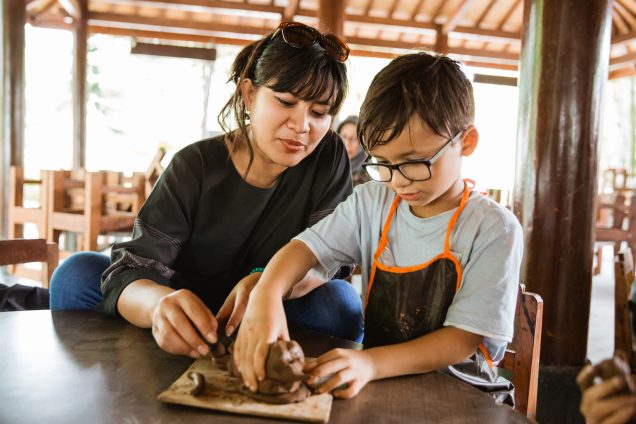The Sky Is The Limit: How To Build Children’s Career Development Skills This Summer
The Sky Is The Limit: How To Build Children’s Career Development Skills This Summer
By Yutong Yuan, Rebecca Markarian and Kimberly A.S. Howard
As any parent can attest, children never cease to amaze us. Their curious brains are constantly
active, exploring the world around them, observing the adults in their lives, and creating
meaning of discoveries they make and patterns they recognize. It should come as no surprise,
then, to learn that whether or not we see it happening, children are forming ideas about the
world of work by watching what the adults around them do for work and how they do it.
This spring we saw schools across the country – and across the world – close in response to the
COVID-19 pandemic. Millions of children remained at home for more than three months,
finishing their spring semester through remote learning. While summer camps have opened up
in a number of states, many parents will continue to keep their children home for the summer,
either by choice, because of limited access to camp opportunities, or for health reasons.
So how will parents and families fill those summer days with their children? Summer provides
idle time that can fuel exploration and creativity, as well as chances to bolster or complement
the academic learning that occurs during the school year. With just a little planning, summer
time activities can spark imagination and start our children on a healthy path of career
development.
Here are seven summertime strategies to help facilitate children’s exploration of occupations
and the development of a simple, foundational understanding of how people prepare
themselves for future work.
1. Draw it out: Bring coloring supplies or chalk to a local park with your children and
spread out your materials. Start by talking with them about what subjects and activities
they enjoy the most. Then, ask your children if they can draw a job related to their
preferred subjects or activities. Art is an active way for children to explore their identity
and express their natural feelings, thoughts, hopes, and dreams. Visualizing their dream
job is a helpful first step in exploring different career paths for children.
2. Use playdough to create what they want to be: On a rainy summer day that you are
stuck inside, set up a playdough activity area on your kitchen table. Let your children use
playdough to create what they want to be and discuss the education and skills involved with
doing their dream job. You can wonder aloud together about different career pathways and
pose questions to playfully explore. For example, you could ask: what do you think you have to
learn to do your dream job, can you show me? Sculpting and modeling with playdough can
improve children’s social emotional development and increase their initiative and curiosity.
Creating what they want to be allows children to form new ideas and concepts about the world
of work which are essential for supporting their own career development.
3. Dramatic play: Engage in dramatic play with your children at your next picnic. Before
heading out of the house, let your children select costumes to bring along with you. You can let them pick from items at home or go out shopping for a new costume or props. Find a more
secluded spot in a park or playground to set up your picnic. As you enjoy your time outside,
provide opportunities for children to dress-up and role play in their costumes. See what
responsibilities and objects they associate with their occupations. After they act, ask them
questions such as: do you enjoy doing the tasks that this job requires? As children take on
different roles, they start to develop beliefs about what abilities and characteristics are needed
for these occupations in the real world. Encouragement during the exploration process can help
support your child’s confidence in relation to different careers.
4. Invite friends over that have a job of interest to your children, and let them talk about
their work: Promote career exploration by asking children to ponder the nature of different
types of work. Ask if your children know: the amount and type of training required for jobs they
are interested in, what skills someone would need in that occupation, and where they would
get specific training. If your children do not have answers, don’t worry! You’re starting at
square one now, and you can help your children find additional information over time. Invite
friends over that have careers your children are interested in and encourage your children to
collect information from them. All of this can be done on a nice day in your backyard while
staying socially distant. The goals here are to illustrate what enthusiasm looks like for a
particular profession and to demonstrate one way of investigating careers of interest.
5. Create a timeline with children for their expected future job: For children in later
elementary school, a timeline helps to set the stage for thoughtful career planning. It allows
children to understand the concrete steps and actions needed to attain their career goals. You
can plan a coffee and lemonade hour with your children outside, and work on creating a
timeline together. Questions you ask may include:
- What education and training are needed for the careers that you are interested
in pursuing? (i.e. Do these careers require a high school diploma, trade
certificate, bachelor’s degree, master’s degree, or doctorate degree?) - What skills and qualities will you need for the careers that you’re interested in?
- Which subjects and courses will help you develop those skills?
6. Share stories of famous people: Many famous people reached the height of their career
after first experiencing failure. By learning the inspiring stories of those that have found success
through failure, children can learn why persistence is key to pursuing their ideal career path —
or paths. Before bedtime, ask your children if they would like to hear about the story of
someone who has found success after failure. If they are interested, read a book or share some
of these inspiring stories you know of with them. Ask them what they learned from these
stories. Understanding that failure is a part of the process will help children develop self-
management skills to better cope with setbacks in their career plan.
7. Share your passions: Take a walk with your child after dinner and enjoy the fresh air. On
your walk, ask your children if they want to know more about how you got your job and what
you love about your job. If they are interested in learning more, then demonstrate your enthusiasm for your job and take time to explain why you are passionate about the work that you do.
Summertime is an opportunity to have fun and to stoke your children’s curiosity about the
world of work. Ask your children what they want to be when they grow up. Help them explore
their interests while doing some fun activities. Remember to keep it simple, keep it positive,
and be ready to help them imagine the possibilities ahead of them.


